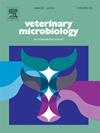A new S1 subunit truncation vaccine induces effective protection against porcine deltacoronavirus in suckling piglets
IF 2.4
2区 农林科学
Q3 MICROBIOLOGY
引用次数: 0
Abstract
Porcine deltacoronavirus (PDCoV) is a novel porcine intestinal coronavirus that causes diarrhea in pigs of various ages, especially in suckling pigs. Developing effective treatments and vaccines is crucial to preventing PDCoV transmission and infection. This study evaluated the immune response elicited by the PDCoV S1 subunit and an inactivated PDCoV vaccine in mice. Indirect ELISA assays revealed a significant enhancement in IgG levels against PDCoV following vaccination with the PDCoV S1 subunit. Neutralization assays and flow cytometry analysis demonstrated that the PDCoV S1 subunit vaccine elicited robust neutralizing antibodies (NAbs) and cellular immune responses. To assess the protective efficacy of the S1 subunit in newborn piglets, pregnant sows were vaccinated with either the S1 or an inactivated PDCoV vaccine at 40 and 20 days before delivery. Five days post-farrowing, piglets were orally challenged with PDCoV strain. Severe diarrhea, high levels of viral RNA copies, and substantial intestinal villus atrophy were detected in piglets born to unimmunized sows. However, immunized S1 piglets showed high NAbs titers and significantly fewer microscopic lesions in the intestinal tissue, with only one piglet showing mild diarrhea. Thus, our results suggest that the PDCoV S1 subunit vaccine is effective with strong immunogenicity and is expected to be a candidate vaccine against PDCoV.
一种新的 S1 亚基截短疫苗可在哺乳仔猪中诱导有效的猪三角锥病毒保护。
猪 deltacoronavirus(PDCoV)是一种新型猪肠道冠状病毒,会导致不同年龄的猪,尤其是乳猪腹泻。开发有效的治疗方法和疫苗对于预防 PDCoV 传播和感染至关重要。本研究评估了 PDCoV S1 亚基和 PDCoV 灭活疫苗在小鼠体内引起的免疫反应。间接 ELISA 检测显示,接种 PDCoV S1 亚基疫苗后,小鼠体内针对 PDCoV 的 IgG 水平显著提高。中和试验和流式细胞术分析表明,PDCoV S1 亚基疫苗可激发强大的中和抗体(NAbs)和细胞免疫反应。为了评估 S1 亚单位疫苗对新生仔猪的保护效力,怀孕母猪在分娩前 40 天和 20 天分别接种了 S1 亚单位疫苗或 PDCoV 灭活疫苗。产后五天,仔猪口服 PDCoV 株。未免疫母猪所产仔猪出现严重腹泻、高水平病毒 RNA 拷贝和大量肠绒毛萎缩。然而,免疫 S1 仔猪的 NAbs 滴度很高,肠道组织的显微病变明显减少,只有一头仔猪出现轻微腹泻。因此,我们的研究结果表明,PDCoV S1 亚单位疫苗有效且免疫原性强,有望成为 PDCoV 的候选疫苗。
本文章由计算机程序翻译,如有差异,请以英文原文为准。
求助全文
约1分钟内获得全文
求助全文
来源期刊

Veterinary microbiology
农林科学-兽医学
CiteScore
5.90
自引率
6.10%
发文量
221
审稿时长
52 days
期刊介绍:
Veterinary Microbiology is concerned with microbial (bacterial, fungal, viral) diseases of domesticated vertebrate animals (livestock, companion animals, fur-bearing animals, game, poultry, fish) that supply food, other useful products or companionship. In addition, Microbial diseases of wild animals living in captivity, or as members of the feral fauna will also be considered if the infections are of interest because of their interrelation with humans (zoonoses) and/or domestic animals. Studies of antimicrobial resistance are also included, provided that the results represent a substantial advance in knowledge. Authors are strongly encouraged to read - prior to submission - the Editorials (''Scope or cope'' and ''Scope or cope II'') published previously in the journal. The Editors reserve the right to suggest submission to another journal for those papers which they feel would be more appropriate for consideration by that journal.
Original research papers of high quality and novelty on aspects of control, host response, molecular biology, pathogenesis, prevention, and treatment of microbial diseases of animals are published. Papers dealing primarily with immunology, epidemiology, molecular biology and antiviral or microbial agents will only be considered if they demonstrate a clear impact on a disease. Papers focusing solely on diagnostic techniques (such as another PCR protocol or ELISA) will not be published - focus should be on a microorganism and not on a particular technique. Papers only reporting microbial sequences, transcriptomics data, or proteomics data will not be considered unless the results represent a substantial advance in knowledge.
Drug trial papers will be considered if they have general application or significance. Papers on the identification of microorganisms will also be considered, but detailed taxonomic studies do not fall within the scope of the journal. Case reports will not be published, unless they have general application or contain novel aspects. Papers of geographically limited interest, which repeat what had been established elsewhere will not be considered. The readership of the journal is global.
 求助内容:
求助内容: 应助结果提醒方式:
应助结果提醒方式:


